Towards State Dependent Control of Brain Circuitry
Presenter
February 12, 2018
Keywords:
- spreading depression, seizures, control, electrical fields, polarization
Abstract
There is a several decade history demonstrating that electrical polarization of neurons can modulate neuronal firing, and that such polarization can suppress (or excite) spiking activity and seizures. In recent years, we uncovered a unification in the computational biophysics of spikes, seizures, and spreading depression (Wei et al J Neurosci 34:11733-11743, 2014). These findings demonstrated that the repertoire of the dynamics of the neuronal membrane encompasses a broad range of dynamics ranging from normal to pathological, and that seizures and spreading depression are manifestations of the inherent properties of those membranes. Most recently, we have demonstrated that neuronal polarization can suppress (or enhance), block, or prevent spreading depression, the physiological underpinning of migraine auras. Remarkably, this suppression requires qualitatively different stimulation from that required to suppress spikes and seizures, and is fully consistent with the computational biophysical models of spreading depression. Further unexpected findings from these experiments was that suppression of spreading depression does not generate seizures, and vice versa, that when the brain is in seizure activity suppression does not generate spreading depression. The implications are that in controlling brain dynamics from different states of the brain, there can be state dependent control which is qualitatively very different from that required in other states.
